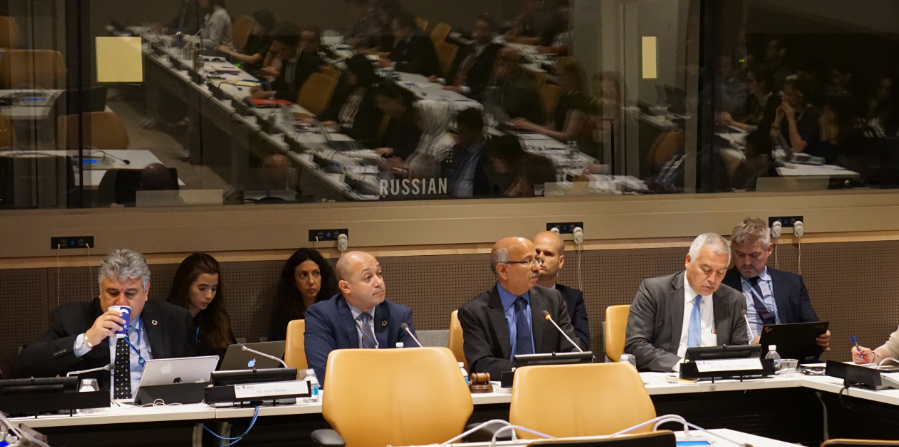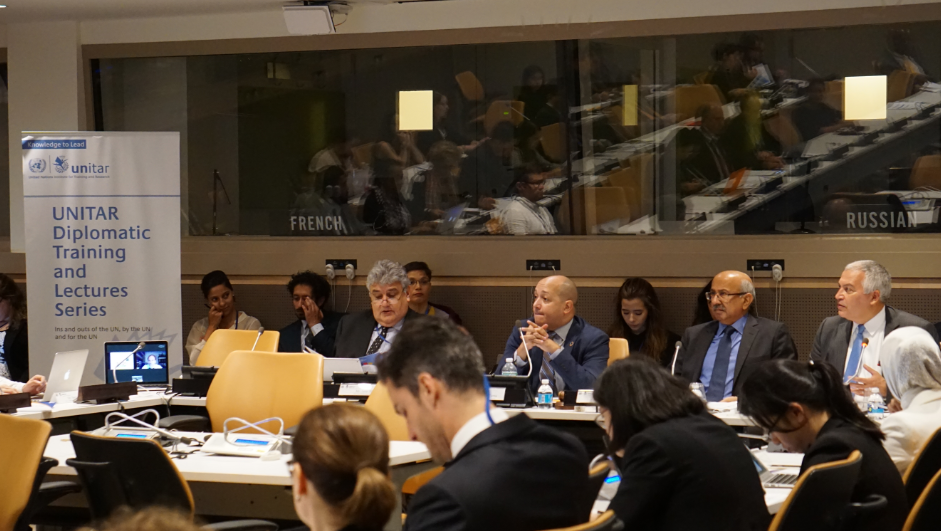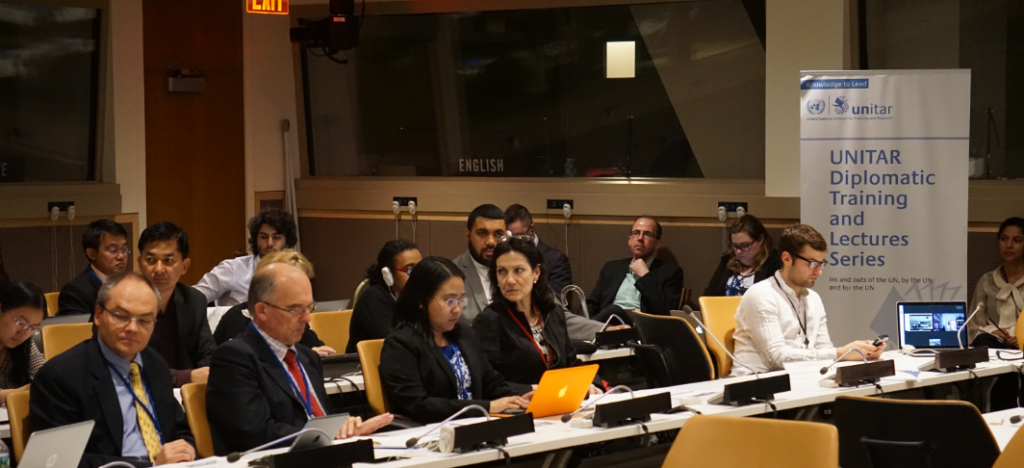UNITAR and UN-DESA Deliver Final Module of QCPR Training Course
 28 September 2016, New York, USA – In partnership with the United Nations Department of Economic and Social Affairs (UN-DESA), UNITAR briefed more than 75 representatives from the UN, private and NGO sectors on the upcoming Quadrennial Comprehensive Policy Review (QCPR) Resolution. The fifth module of the briefing series provided an overview and wrap-up of the issues discussed through Modules 1 to 4. Three panellists along with Mr. Navid Hanif, the Director of the Office for ECOSOC Support and Coordination at UN-DESA and Mr. Marco A. Suazo, Director of UNITAR’s New York Office, spoke during the event.
28 September 2016, New York, USA – In partnership with the United Nations Department of Economic and Social Affairs (UN-DESA), UNITAR briefed more than 75 representatives from the UN, private and NGO sectors on the upcoming Quadrennial Comprehensive Policy Review (QCPR) Resolution. The fifth module of the briefing series provided an overview and wrap-up of the issues discussed through Modules 1 to 4. Three panellists along with Mr. Navid Hanif, the Director of the Office for ECOSOC Support and Coordination at UN-DESA and Mr. Marco A. Suazo, Director of UNITAR’s New York Office, spoke during the event.
 Mr. Suazo began the briefing with a short introduction, outlining the topics of the previous modules of the QCPR series to refresh the memories of the participants. Mr. Hanif followed, also welcoming the participants and panellists, and delving into the importance of the QCPR and the opportunity that it presents to shift the conversation around critical UN issues. He specifically spoke about the recommendations for the next QCPR Resolution in the Secretary-General’s report (A/71/292/Rev.1) of 27 September 2016. UNITAR’s New York Office has supported the call of the report to support and utilize, wherever feasible, national evaluation capacities, and to strengthen system-wide evaluation, through its courses and briefings on relevant topics. Mr. Hanif also spoke about changing the theological, micromanagement and ECOSOC dialogues because of the new 2030 Sustainable Development Agenda that was developed in 2014, after the prior QCPR in 2012. Mr. Hanif reiterated that there must be a great deal of reflection heading into the QCPR Resolution process to ensure that the new resolution caters to the new 2030 Agenda framework.
Mr. Suazo began the briefing with a short introduction, outlining the topics of the previous modules of the QCPR series to refresh the memories of the participants. Mr. Hanif followed, also welcoming the participants and panellists, and delving into the importance of the QCPR and the opportunity that it presents to shift the conversation around critical UN issues. He specifically spoke about the recommendations for the next QCPR Resolution in the Secretary-General’s report (A/71/292/Rev.1) of 27 September 2016. UNITAR’s New York Office has supported the call of the report to support and utilize, wherever feasible, national evaluation capacities, and to strengthen system-wide evaluation, through its courses and briefings on relevant topics. Mr. Hanif also spoke about changing the theological, micromanagement and ECOSOC dialogues because of the new 2030 Sustainable Development Agenda that was developed in 2014, after the prior QCPR in 2012. Mr. Hanif reiterated that there must be a great deal of reflection heading into the QCPR Resolution process to ensure that the new resolution caters to the new 2030 Agenda framework.
 H.E. Mr. Alejandro Palma Cerna, the Deputy Permanent Representative of Honduras to the United Nations, was the first panellist to speak at the briefing. His Excellency focused on important improvements that need to be made to the UN system, and therefore highlighted a number of shortcomings that he sees within the UN as an organization that can be improved on in the future. A consistent theme throughout his presentation was the lack of continuity and communication throughout projects in the UN; he noted that many UN entities have their own book of implementations, making coordination very difficult between UN components. He also called for the strengthening of multiple UN components, including UN leadership and the development of a single comprehensive UN strategic planning country team, as well as the strengthening of ECOSOC as a system-wide mechanism for coordination. Mr. Palma Cerna stressed finally that the QCPR is just a beginning step to start the process of rethinking the architecture at the field level, and that much more will need to be done following the QCPR as well to make sure that changes are implemented in practice.
H.E. Mr. Alejandro Palma Cerna, the Deputy Permanent Representative of Honduras to the United Nations, was the first panellist to speak at the briefing. His Excellency focused on important improvements that need to be made to the UN system, and therefore highlighted a number of shortcomings that he sees within the UN as an organization that can be improved on in the future. A consistent theme throughout his presentation was the lack of continuity and communication throughout projects in the UN; he noted that many UN entities have their own book of implementations, making coordination very difficult between UN components. He also called for the strengthening of multiple UN components, including UN leadership and the development of a single comprehensive UN strategic planning country team, as well as the strengthening of ECOSOC as a system-wide mechanism for coordination. Mr. Palma Cerna stressed finally that the QCPR is just a beginning step to start the process of rethinking the architecture at the field level, and that much more will need to be done following the QCPR as well to make sure that changes are implemented in practice.
 Mr. Palma Cerna was followed by Mr. Amir Abdulla, the Vice-Chair of the UN Development Group and the Deputy Executive Director of the World Food Programme, whose presentation primarily addressed the need for transformative change in the QCPR. He proposed changes in the UN meant to revitalize the system, such as shifting from delivering aid to ending the need for aid all together. Mr. Abdulla also identified the QCPR as an opportunity to fully align UN policy with the new Sustainable Development Goals and the 2030 Agenda. He also called for Member States to take onus of the development agenda and to lead the efforts to realize the Development Goals.
Mr. Palma Cerna was followed by Mr. Amir Abdulla, the Vice-Chair of the UN Development Group and the Deputy Executive Director of the World Food Programme, whose presentation primarily addressed the need for transformative change in the QCPR. He proposed changes in the UN meant to revitalize the system, such as shifting from delivering aid to ending the need for aid all together. Mr. Abdulla also identified the QCPR as an opportunity to fully align UN policy with the new Sustainable Development Goals and the 2030 Agenda. He also called for Member States to take onus of the development agenda and to lead the efforts to realize the Development Goals.
Mr. Stephen Browne, a Fellow at the Ralph Bunche Graduate Institute for International Studies and the Co-Director of the Future UN Development Systems (FUNDS) project, provided the final address of the afternoon. Mr. Browne listed a number of UN realities that he said participants must take as facts going into the QCPR negotiations. These included: a lost focus on technical assistance, a decline in pure multilateralism, growing frustration with a disjointed UN, a changing role for the UN in middle-income countries, and the fact that the SDGs are missing some key issues. He further listed things about the UN system that are issues that are unchangeable in his mind, at least in the short-term. He concluded his presentation with a list of changes that he sees as possible in the upcoming QCPR Resolution: coordination of HQ in greater support of field operations and the development of compatible business practices.
Following Mr. Browne’s presentation, many participants raised questions and comments on various issues. Upon conclusion of the briefing, a humble reception was organized by UNITAR’s NYO to close the five module QCPR series that has taken place over the last few months.
Photo Credits: UNITAR

